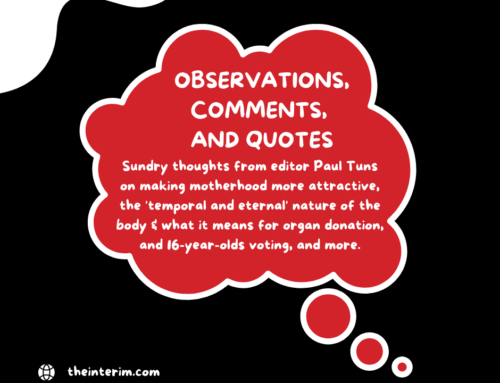Don’t Be Canada: How One Country Did Everything Wrong All at Once:
Tristan Hopper (Sutherland House, $22.95, 126 pages)
 National Post writer Tristan Hopper has written a recent history of Canada that serves as a warning for the rest of the world. Recently, Canadians have enjoyed a splurge of patriotism in reaction to U.S. President Donald Trump, but Hopper says we should not get too big for our britches as he explains recent social policy experiments gone awry in eight chapters on euthanasia, identity politics, affordable housing, drug decriminalization, transgenderism, Orwellian controls on free speech, going easy on criminals, and the high cost of “free” health care. Many of our sources of pride – our health care system, our welfare state, our tolerance – are susceptible to gross injustices.
National Post writer Tristan Hopper has written a recent history of Canada that serves as a warning for the rest of the world. Recently, Canadians have enjoyed a splurge of patriotism in reaction to U.S. President Donald Trump, but Hopper says we should not get too big for our britches as he explains recent social policy experiments gone awry in eight chapters on euthanasia, identity politics, affordable housing, drug decriminalization, transgenderism, Orwellian controls on free speech, going easy on criminals, and the high cost of “free” health care. Many of our sources of pride – our health care system, our welfare state, our tolerance – are susceptible to gross injustices.
Hopper said that Canada has a “low-barrier approach to assisted dying” (euthanasia) and that it is now the “poster child for what happens when a country becomes drunk on easy euthanasia,” as he relates numerous horror stories of people who are not terminally ill seeking euthanasia because they lack social supports, or are pressed into it. Or the weird reality that Canada stopped executing criminals in 1962 but permits convicts to request euthanasia in prison. He mocks the Supreme Court for saying most safeguards would be unnecessary because euthanasia would be utilized infrequently; yet as Hopper notes, Medical Assistance in Dying deaths increase by about 30 per cent annually.
Hopper describes the human toll of easy access to legal drugs, how high housing costs hurt families, why transgender rights violate the rights of parents and others who object to the self-identification mania, and the totalitarian nature of legislation such as the Online Streaming Act. As Hopper states in his introduction, “call it extreme progressivism, call it political correctness, call it wokeness, call it post-nationalism, or call it post-modernism: whatever it is, Canada has been getting it harder and faster than anyone else.” That is a debatable but defensible assertion; it is less clear – especially after Canadians re-elected the Liberals to a fourth term, just as Don’t Be Canada was being released – that “for the most part, Canadians are not liking what they see.” Or perhaps it is fairer to say they don’t see what is wrong in the country, in which case they should be reading Tristan Hopper’s book.




